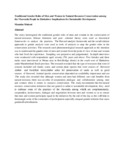Please use this identifier to cite or link to this item:
https://cris.library.msu.ac.zw//handle/11408/1967| Title: | Traditional gender roles of men and women in natural resource conservation among the Vhavenda people in Zimbabwe: implications for sustainable development | Authors: | Mukoni, Manuku | Keywords: | Traditional gender roles Natural resources, conser vation, sustainable development |
Issue Date: | Apr-2015 | Publisher: | Center for Promoting Ideas | Series/Report no.: | International Journal of Humanities and Social Science;Vol. 5, No. 4(1); p. 76-84 | Abstract: | The study interrogated the traditional gender roles of men and women in the conservation of natural resources. African feminism and post- colonial theory were used as theoretical frameworks to analyze the practices. The Harvard analytic framework and the social relation approach to gender analysis were used as tools of analysis to map the gender roles in the conservation activities. The research used phenomenological research approach as the intention was to understand the gender roles of men and women from the point of view of men and women who had lived the experience. Sampling was purposive and judgemental. In-depth interviews were conducted with respondents aged seventy (70) years and above. Five females and three males were interviewed at Msane area in Beit-Bridge district in the south west of Zimbabwe under Matabeleland South province. The research revealed that the type of resources that were of concern included soil (land), water, and certain plant species that were sources of firewood ,timber and food(fruit trees),timber ashes for preservation of seeds as well as good sources of firewood .Animal species conservation depended on availability importance and use .The study also re vealed that although women and men had different uses and benefits from natural resource, there was an ethic of cooperation ,dialogue and collaboration among men and women when it comes to resource conservation. The study recommends that for natural resource conservation initiatives that are geared to achieve sustainable development, they need to embrace some of the practices of the vhavenda among which are complementarity, cooperation, inclusiveness, dialogue and negotiation between men and women so as to ensure that men and women participate equal in the initiatives by the end of the day as this will help to disentangle some of the constraints of participation especially unequal gender relations that cause gendered subordination. | Description: | A publication by Mrs Manuku Mukoni a Lecturer in the Department of Gender Studies, Midlands State University, Zimbabwe | URI: | https://www.researchgate.net/.../277015732 http://hdl.handle.net/11408/1967 |
ISSN: | 2221-0989 |
| Appears in Collections: | Research Papers |
Files in This Item:
| File | Description | Size | Format | |
|---|---|---|---|---|
| Traditional Gender Roles of Men and Women in Natural Resource Conservation among the Vhavenda People in Zimbabwe.pdf | Abstract | 6.5 kB | Adobe PDF |  View/Open |
Items in MSUIR are protected by copyright, with all rights reserved, unless otherwise indicated.



